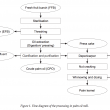Journal of Oil Palm Research Vol. 32 (4) December 2020, p. 688-695
CODE OF GOOD MILLING PRACTICE IN ENHANCING SUSTAINABLE PALM OIL PRODUCTION
DOI: https://doi.org/10.21894/jopr.2020.0055
Received: 28 June 2019 Accepted: 23 October 2019 Published Online: 10 September 2020
Fresh fruit bunches (FFB) are continuously being produced throughout the year, hence the mill also needs to operate continuously to process them. Compared to other oil crops, oil palm is more productive and produces the highest oil yield per hectare. However, like any other industry, palm oil processing can also have adverse impact on the environment. Therefore, this article focuses on the operation of palm oil mill by addressing the impact on quality, food safety and some sustainability elements as measurable parameters when gauging the impacts of the processing operation. This article also emphasises the implementation of the Malaysian Palm Oil Board Code of Good Milling Practices (MPOB CoPM) as a guideline for the mills in readiness for sustainability certification under the Malaysian Sustainable Palm Oil (MSPO)/Roundtable on Sustainable Palm Oil (RSPO). Under sustainability, the three well-established elements will be examined and they are environmental protection, social responsibility and economic practice. The palm oil processing plant should produce palm oil that can be classified as sustainable palm oil, otherwise it may not be able to enjoy global marketability.
KEYWORDS:FIGURES & TABLES:
* Malaysian Palm Oil Board,
6 Persiaran Institusi, Bandar Baru Bangi,
43000 Kajang, Selangor, Malaysia.
E-mail: nurul.fathiah@mpob.gov.my
